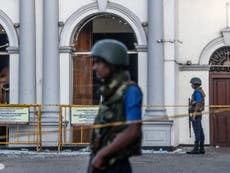Sri Lanka left resentments to fester in a fragmented country – the response to the bombings will now be a defining test
Some of us are old enough to remember a time, in the Seventies and Eighties, when the state’s response to a handful of violent Tamil nationalists won the militants recruits and led to bloody chaos

The horrific events of Easter Day in Sri Lanka have left over 300 dead, many others injured, bereaved and traumatised. After decades of large-scale violence, which ended less than 10 years ago, many in the island and beyond will be fearful of a return to past horrors.
The immediate task is to care for the survivors and those who lost loved ones, as well as tightening security and establishing why warnings were not acted upon. Then come the decisions for the future. Sri Lankans will have to find a way to stop the bombings leading to a downward spiral.
This includes learning from grim as well as uplifting aspects of the island’s history, and from the lessons found in similar moments around the world. This store of knowledge is important if mental, spiritual and physical wounds are to be healed and further violence avoided, as far as possible.
Some of us are old enough to remember a time, in the late Seventies and early Eighties, when the state’s response to a handful of violent Tamil nationalists won the militants recruits and led to bloody chaos. Though the circumstances are different, there are important lessons. The most crucial of which is that attackers must be isolated in order to build up support.
The fringe group declared to be responsible seems deeply unpopular among other Muslims who have come across them. Muslims, in fact, were among those they murdered at Easter.
If they thought they were avenging the Christchurch massacre by killing yet more innocent people, this had nothing to do with Sri Lankan Muslims’ specific experience, as well as making no sense anyway. The attacker in New Zealand, though supposedly defending western Christian civilisation, appears to have been as much “pagan” as anything else, as well as a white supremacist unlikely to shed tears over dead Asians of any faith. It’s fair to note too that jihadists’ targets are often fellow Muslims.
However some “revenge” attacks have taken place on Muslims who had nothing to do with Sunday’s horror. This, of course, plays into the hands of the terrorists – and all others seeking mayhem and fragmentation in Sri Lanka and beyond.
It is important for the state to protect ordinary Muslims and make sure that it targets only the terrorists, sticking to rigorously the rule of law to make sure others are not caught in the net and left embittered – and more open to radicalisation.
In Sri Lanka, there remain wrongs that have been left to fester. Human rights violations during the war years, by government and paramilitary forces and armed groups in different communities, have never been properly addressed. Nor have minorities’ insecurity and grievances, or the needs of poorer people of any ethnicity or religion, been dealt with adequately.
In fact, some politicians have lined up with so-called Buddhists (though their actions are far removed from the Buddha’s teachings) to harass and terrorise Christians and Muslims. This has fostered a climate where lawless brutality simmers.
Meanwhile extremism, under a religious guise, has taken root among some Hindu Tamils, as well as Muslims. Most people who are religiously conservative, even prejudiced, have no truck with terror, but nevertheless, such trends must be questioned. This includes listening to Muslim feminists who have raised concerns about narrow and authoritarian misreadings of faith, and not treating male “leaders” as speaking for whole communities. In a turbulent world, twisted versions of belief that offer “certainty” and power can seem seductive, especially to the disaffected.
Kindness, justice-seeking and bridge-building, however, deserve to be recognised and supported. Right now, love and hope should have the last word.






Join our commenting forum
Join thought-provoking conversations, follow other Independent readers and see their replies